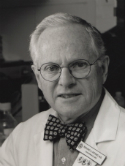Histone deacetylase inhibitor selectively induces p21WAF1 expressjon and gene-associated histone acetylation Journal Article
| Authors: | Richon, V. M.; Sandhoff, T. W.; Rifkind, R. A.; Marks, P. A. |
| Article Title: | Histone deacetylase inhibitor selectively induces p21WAF1 expressjon and gene-associated histone acetylation |
| Abstract: | Histone deacetylases (HDACs) catalyze the removal of acetyl groups on the amino-terminal lysine residues of core nucleosomal histories. This activity is associated generally with transcriptional repression. We have reported previously that inhibition of HDAC activity by hydroxamic acid-based hybrid polar compounds, such as suberoylanilide hydroxamic acid (SAHA), induces differentiation and/or apoptosis of transformed cells in vitro and inhibits tumor growth in vivo. SAHA is a potentially new therapeutic approach to cancer treatment and is in Phase I clinical trials. In several tumor cell lines examined, HDAC inhibitors alter the expression of less than 1% of expressed genes, including the cell cycle kinase inhibitor p21WAF1. In T24 bladder carcinoma cells, SAHA induces up to a 9-fold increase in p21WAF1 mRNA and protein, which is, at least in part, because of an increase in the rate of transcription of the gene. SAHA causes an accumulation of acetylated histones H3 and H4 in total cellular chromatin by 2 h, which is maintained through 24 h of culture. An increase in the accumulation of acetylated H3 and H4 was detected throughout the p21WAF1 promoter and the structural gene after culture with SAHA. The level of histone acetylation did not change in chromatin associated with the actin and p27 genes, and their mRNA expression was not altered during culture of T24 cells with SAHA. Thus, the present findings indicate that the induction of p21WAF1 by SAHA is regulated, at least in part, by the degree of acetylation of the gene-associated histones and that this induced increase in acetylation is gene selective. |
| Keywords: | controlled study; unclassified drug; human cell; polymerase chain reaction; cell proliferation; gene; apoptosis; gene expression; protein; genetic transcription; transcription, genetic; tumor cells, cultured; enzyme inhibitor; enzyme activity; urinary bladder neoplasms; cancer inhibition; gene expression regulation, neoplastic; messenger rna; enzyme inhibitors; histone; chromatin; anticarcinogenic agents; vorinostat; hydroxamic acids; cell nucleus; cyclin-dependent kinase inhibitor p21; dna primers; cyclins; protein p21; histones; histone deacetylases; lysine; histone deacetylase; acetylation; acetic acid derivative; gene expression regulation, enzymologic; hdac inhibitor; hydroxamic acid derivative; humans; human; priority journal; article; suberoylanilide hydroxamic acid (saha) |
| Journal Title: | Proceedings of the National Academy of Sciences of the United States of America |
| Volume: | 97 |
| Issue: | 18 |
| ISSN: | 0027-8424 |
| Publisher: | National Academy of Sciences |
| Date Published: | 2000-08-29 |
| Start Page: | 10014 |
| End Page: | 10019 |
| Language: | English |
| PUBMED: | 10954755 |
| PROVIDER: | scopus |
| PMCID: | PMC27656 |
| DOI: | 10.1073/pnas.180316197 |
| DOI/URL: | |
| Notes: | Export Date: 18 November 2015 -- Source: Scopus |
Altmetric
Citation Impact
BMJ Impact Analytics
Related MSK Work






